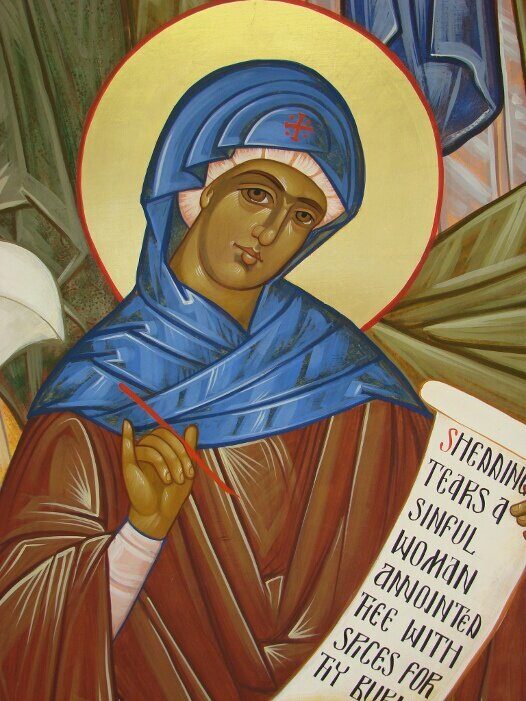[April 27, 2016]
In the first three days of Holy Week, Orthodox Christians have a series of three Matins services called “Bridegroom Matins.” We sing:
I behold Thy bridal chamber richly adorned, O my Savior,
But I have no wedding garment to worthily enter.
Make radiant the garment of my soul,
O Giver of Light, and save me.
During the Wednesday Matins service (usually offered Tues night) the hymns keep juxtaposing Judas, who sold the Savior, with the adulterous woman, who poured out costly ointment on his feet. It is the only time during the year that we sing the Hymn of St. Cassiane (many spellings: Cassia, Kassia, Kassiani, etc).
St. Cassiane lived in the 9th century, and was a well-educated and gifted young woman. She was outspoken in support of icons during the iconoclast controversy, even though she was scourged for it. “I hate silence when it is time to speak” she said.
Every year I see someone post this beautiful rendition of the Hymn on Facebook, and smile because the chanter is Margo Sinkevitch, who was the choir director at Holy Cross Church in the 90s, when I was writing “Facing East.” (Standing beside her, singing the ison / drone, is her husband David, whom I called “Musical David” or “M David.”) This video was made when Margo and David were living in Moscow, at the English-language church, St. Catherine. Margo is an extraordinary singer, and it’s a hauntingly beautiful song.
https://www.youtube.com/watch?v=K24uYcbLA_U
O Lord God, the one who had fallen into many sins, having perceived Thy divinity, received he rank of ointment-bearer, offering Thee spices before Thy burial.
Wailing and crying, “Woe is me, for the love of adultery and sin hath given me a dark and lightless night.
“Accept the fountains of my tears, O Thou who drawest the waters of the sea by the clouds.
Incline, O incline Thou to the sigh of my heart, O Thou who didst bend the heavens by Thine inapprehensible condescension.
“I will kiss Thy pure feet and I will wipe them with my tresses.
“I will kiss Thy feet whose tread, when it fell on the ears of Eve in Paradise, dismayed her so that she did hide herself because of fear.
“Who then shall examine the multitude of my sins, and the depth of Thy judgments?
“Wherefore, O my Savior and the deliverer of my soul, turn not away from Thy handmaiden, O Thou of countless mercies.”

The story goes that Cassiane was one of 6 beautiful young women brought before Emperor Theophilus, so he could choose a bride (in accord with the Greek myth of Paris, he handed his choice a golden apple). He had heard of Cassiane’s intelligence and challenged her, “By woman came the Fall” (meaning Eve). Cassiane shot back, “And by woman came the rising” (meaning St Mary the Theotokos). Theophilus was taken aback, and gave the golden apple to Theodora instead—also a supporter of icons, but not as outspoken as Cassiane.
There’s a story—rather romantic and perhaps mere legend, but still a good story—that in his later years Emperor Theophilus went to see Cassiane one last time before he died, because he had always retained a love for her. Cassiane was in her cell, writing this Hymn, when she heard the noise of the imperial retinue. In her turn, Cassiane had loved Theophilus, but did not want to chance reawakening feelings that she had overruled with her monastic vow. Before he arrived in her room she hid in a nearby closet, leaving the unfinished Hymn on her desk.
Theophilus found her cell empty, and wept; he then went to her desk, to see what she was writing. He added to it the line, “Thy feet whose tread, when it fell on the ears of Eve in Paradise, dismayed her so that she did hide herself.” When he was about to leave he noticed Cassiane in her hiding place, but he did not speak to her, out of respect for her decision to avoid him. After he left Cassiane went to her desk and saw the line he had added, and incorporated it into the Hymn.
(By the way, after Theophilus died, Empress Theodora was able to bring about the restoration of icons in AD 843. Speaking out is good, but staying quiet and waiting for the right moment is also a strategy.)

I just found your blog through your recent piece on abortion. I loved the recent post on being a wife, and also this post, since my 3-year-old Cassia was named after this saint. I wish I had met you when we were living in Baltimore (2010-2012). I now live in South Africa. Thanks for speaking to my heart across the miles.
FMG: Have a blessed Dormition Fast!
I have a question that hopefully you can answer in regard to the Gloria Steinem quote "A feminist is anyone who recognizes the equality and full humanity of women …" That statement has been quoted often on the internet, but nobody seems to cite the original source of it. The only citation I have found for it is in your September 1994 article "Feminists Should Oppose Abortion," in Feminism: Opposing Viewpoints. Do you know the original source of that quote? The article, book or speech in which Gloria Steinem first said it. Thank you.
FMG: Gosh, no, I don't! Back in those pre-internet days, I had read it somewhere, but did not write down the source. It may well be that it was second-hand, ie the author of the piece was not Steinem, but quoted her, and I just passed on the quote. If you can't find it anywhere, it may well not be authentic.